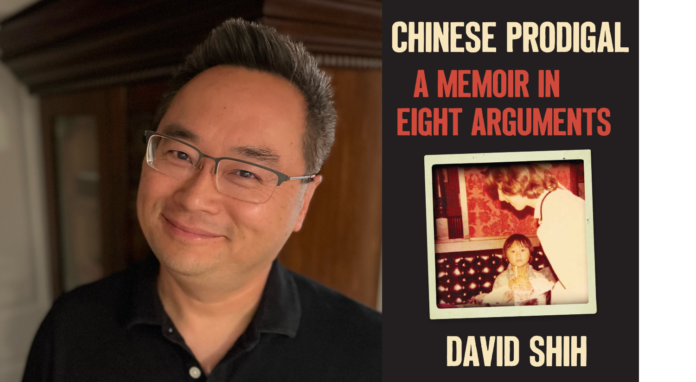By Lindsay Wang
In 2019, David Shih’s father passed away two weeks after being hospitalized due to a stroke. In those two weeks, Shih did not return home to see his father before he passed.
“Quite honestly, the shame of not being there when he died was the emotion that prompted me to write about it—very simply, I needed to process it,” he said. “And so writing about it was the natural response.”
The result of that response is Chinese Prodigal: A Memoir in Eight Arguments, published this week by Grove Atlantic. A blend of memoir, cultural criticism and history, this book is divided into eight chapters that each examine a particular facet of the Asian American experience. Drawing anecdotes from literature, history and his own life, Shih, who is a professor of English at the University of Wisconsin-Eau Claire, addresses issues ranging from interracial relationships to affirmative action to police brutality to Asian American identity formation.
As a member of Generation X, Shih said that some of the topics he wrote about were easier to pin down than others. “When you’re a … Chinese American, an East Asian American of my generation, Generation X, you’re going to have to think about Vincent Chin, right?” he said. “And then you’re going to have to think about being the model minority, especially the way that it was framed in the 80s, and then the way it’s kind of morphed over the last decade when it comes to affirmative action… So those were the easy ones.”
LATEST STORIES
At the core of the text is Shih’s understanding of the ways in which what it means to be Asian American has or hasn’t changed over the years—an understanding that is informed by his generational perspective.
“This is a very old-fashioned book,” he said. “I said [to my editor], I don’t think we have to be cutting edge here. To me, talking about racism as it relates to Asian Americans still has to return to anti-Blackness. It’s an old-fashioned book in its understanding that anti-Blackness is at the root of racism in this country, and the Asian American experience emerges out of that tension in that conflict.”
Another underlying theme of the text is the role of language in identity formation, especially that of a racialized identity. For Shih, whose father didn’t want him to learn Chinese, that relationship is particularly nuanced.
“[I was] somebody who never really had a problem with English and was constantly praised for it, in ways that flattered me as a young man well into my 20s,” he said. “And only after that did I begin to understand the nature of the relationship between that person complimenting me and myself.”
The question of language is spotlighted in Chapter 7: Paper Sons, which Shih said is one of his favorite chapters. “It’s about learning how to read and how I think, especially when it comes to writing by people of color, that there’s very often the assumption that it ought to be done so that we learn more about the person of color, or the ethnic or racial group that they belong to,” he said.
“The book isn’t about [getting] them to know more about culture,” he added. “The goal of reading these books, and reading them well, is to know more about yourself so that you have more control over your life.”
Chinese Prodigal is a text that challenges its own readers to critically engage with the arguments it puts forward, to reevaluate the preconceptions with which we approach the narratives we consume. Shih makes this clear at the very beginning of his book, writing in the introduction, “[T]he meaning of Chinese Prodigal, ultimately, must come from someone other than me.”
Despite his belief in the reader’s responsibility to make meaning out of his story, Shih said that he still hopes that one message comes across clearly—so much so that he put it in the title, Chinese Prodigal. “I hope it comes through … that I really love my father, and I really love my mother,” he said. “And that it took me a while to see how much they loved me.”
This message speaks to Shih’s observation of a larger trend of characterizing Asian American literature as stories about “intergenerational problems and traumas,” which are only part of the truth of what it means to be Asian American.
“What I don’t want people to think is that [these relationships are] there because of any essential dysfunction within the Asian family, right?” he added. “They’re there because of capitalism, because of white supremacy, and homophobia and the need to live a comfortable, decent life in this country. The conflicts arise from those structural tensions.”
This is a message that came across to me as I read about Shih’s memories of working for his parents’ porcelain wholesaling business and even of his experiences in raising his own family, whose biracial composition introduced distinct tensions and dynamics. But even if it didn’t come across to his readers, this message has certainly manifested in Shih’s own life.
“I was just Zooming with my mom,” he said. “She said, ‘I forgot to tell you another story about racism that happened.’ And so, you know, it’s just delightful to have these kinds of conversations with your parents now.”
(Editor Note: A portion of the sale of Chinese Prodigal through the above links benefit AsAmNews)
AsAmNews is published by the non-profit, Asian American Media Inc. Follow us on Facebook, X, Instagram, TikTok and YouTube. Please consider making a tax-deductible donation to support our efforts to produce diverse content about the AAPI communities. We are supported in part by funding provided by the State of California, administered by the California State Library in partnership with the California Department of Social Services and the California Commission on Asian and Pacific Islander American Affairs as part of the Stop the Hate program. To report a hate incident or hate crime and get support, go to CA vs Hate.








